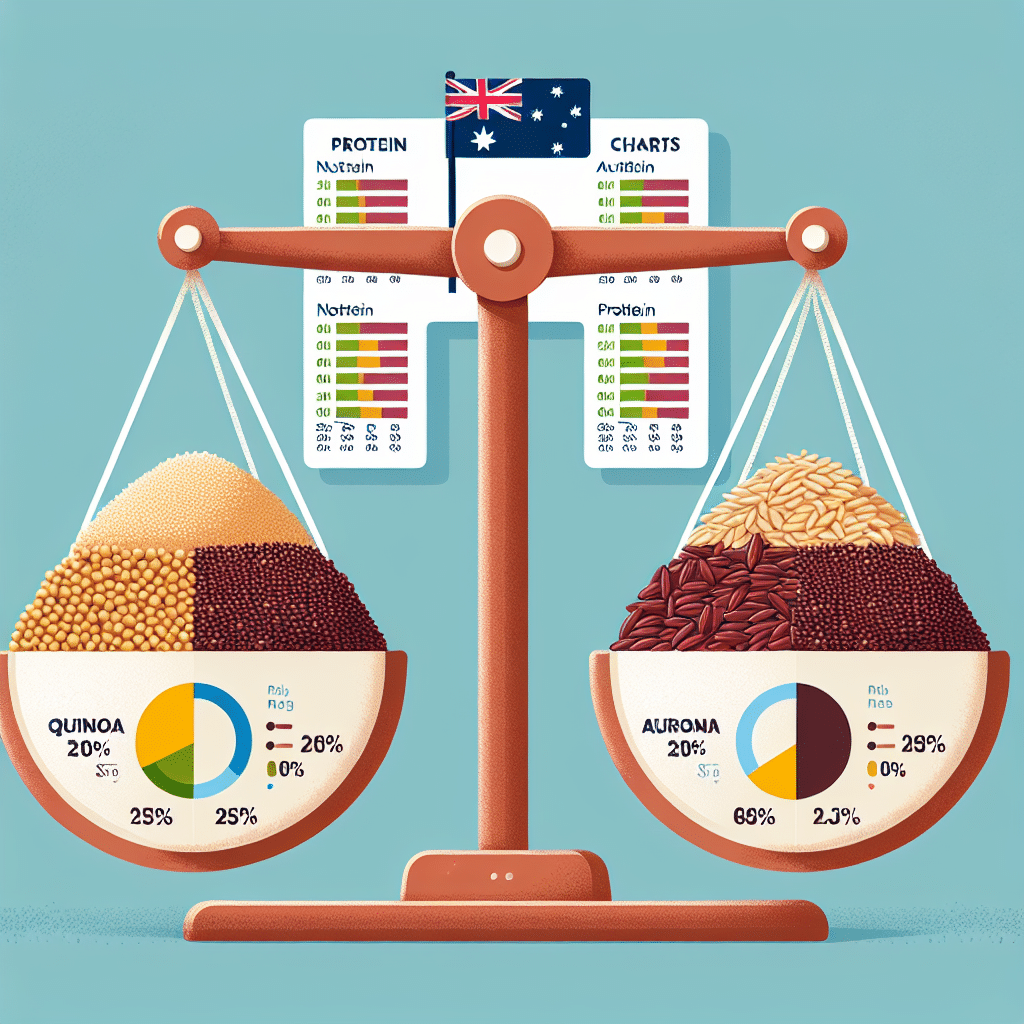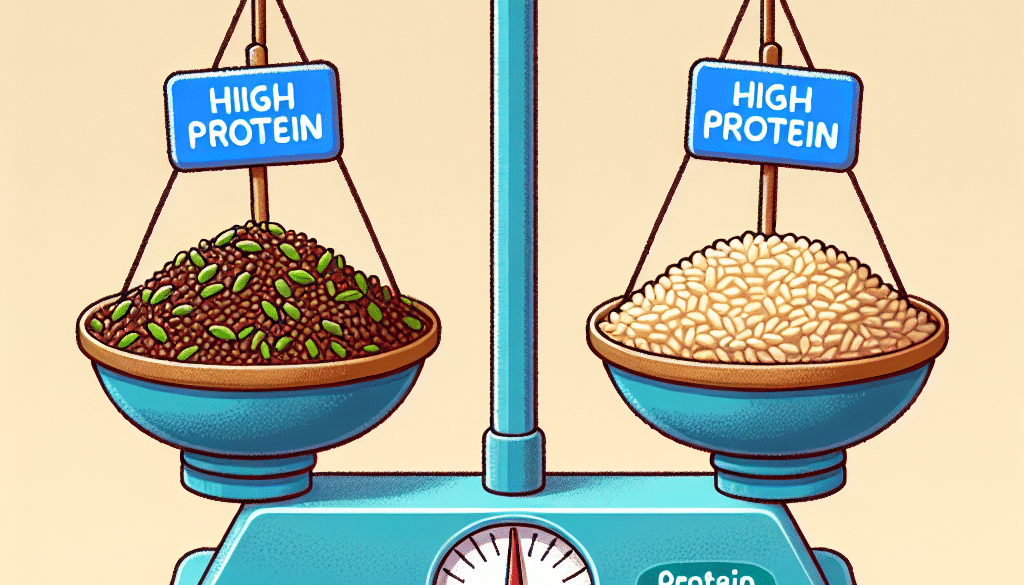Is Quinoa Better Than Brown Rice For Protein?
-
Table of Contents
- Quinoa vs. Brown Rice: A Protein-Packed Comparison
- Nutritional Overview of Quinoa and Brown Rice
- Protein Content Comparison
- Amino Acid Profiles
- Health Benefits Beyond Protein
- Environmental and Economic Considerations
- Conclusion: Which Is Better for Protein?
- Discover ETprotein’s High-Quality Protein Products
Quinoa vs. Brown Rice: A Protein-Packed Comparison

When it comes to choosing healthy grains, quinoa and brown rice are often at the forefront of many health-conscious consumers’ minds. Both are touted for their nutritional benefits, including their protein content. But is one truly better than the other for protein? This article delves into the nutritional profiles of quinoa and brown rice, examining their protein content, amino acid composition, and overall health benefits to determine which grain might be the superior source of protein.
Nutritional Overview of Quinoa and Brown Rice
Before we compare the protein content of quinoa and brown rice, let’s take a look at their general nutritional makeup.
- Quinoa: Often referred to as a “superfood,” quinoa is a seed that is prepared and eaten similarly to a grain. It is high in fiber, vitamins, minerals, and antioxidants. Quinoa is also one of the few plant foods that contain all nine essential amino acids, making it a complete protein.
- Brown Rice: Brown rice is a whole grain that is less processed than white rice, retaining its bran and germ. This means it contains more fiber, vitamins, and minerals compared to its white counterpart. However, brown rice is not a complete protein, as it lacks sufficient amounts of some essential amino acids.
Protein Content Comparison
When it comes to protein content, quinoa generally has the upper hand. A cup of cooked quinoa contains about 8 grams of protein, while the same amount of cooked brown rice has about 5 grams. This difference might seem small, but it can add up over time, especially for those who rely on plant-based sources for their protein needs.
Amino Acid Profiles
The quality of protein is determined not just by the amount of protein, but also by its amino acid profile. Amino acids are the building blocks of protein, and nine of them are considered essential because our bodies cannot produce them—they must be obtained through diet.
- Quinoa: As a complete protein, quinoa contains all nine essential amino acids in adequate amounts. This is particularly beneficial for vegetarians and vegans who may struggle to get all essential amino acids from a plant-based diet.
- Brown Rice: While brown rice contains a decent amount of protein, it is low in the amino acid lysine. To form a complete protein, brown rice should be paired with other lysine-rich foods, such as beans or lentils.
Health Benefits Beyond Protein
Protein is just one factor to consider when choosing between quinoa and brown rice. Both grains offer a range of health benefits that go beyond their protein content.
- Quinoa: It is gluten-free, which makes it a great option for those with celiac disease or gluten sensitivity. Quinoa also has a low glycemic index, which is beneficial for blood sugar control.
- Brown Rice: Brown rice is rich in manganese, which is important for bone development and wound healing. It also contains phenols and flavonoids, antioxidants that help protect the body from oxidative stress.
Environmental and Economic Considerations
When choosing between quinoa and brown rice, it’s also worth considering the environmental and economic impacts of each. Quinoa is primarily grown in South America, and its popularity has led to concerns over sustainable farming practices and the impact on local economies. Brown rice is more widely available and typically has a lower carbon footprint when grown locally.
Conclusion: Which Is Better for Protein?
In conclusion, while both quinoa and brown rice are nutritious options, quinoa comes out ahead in terms of protein content and quality. Its complete amino acid profile makes it an excellent choice for those looking to boost their protein intake, particularly for plant-based eaters. However, brown rice remains a valuable part of a balanced diet, especially when combined with other protein sources.
Ultimately, the choice between quinoa and brown rice may come down to personal preference, dietary needs, and environmental considerations. Including a variety of grains in your diet is the best way to ensure you’re getting a wide range of nutrients.
Discover ETprotein’s High-Quality Protein Products
If you’re looking to enhance your protein intake further, consider exploring ETprotein’s range of organic bulk vegan proteins. Their products, including organic rice protein and pea protein, offer high-quality, allergen-free options for those seeking to supplement their diet with additional protein sources. With a commitment to sustainability and quality, ETprotein caters to various industries and dietary needs.
About ETprotein:
ETprotein, a reputable protein and L-(+)-Ergothioneine (EGT) Chinese factory manufacturer and supplier, is renowned for producing, stocking, exporting, and delivering the highest quality organic bulk vegan proteins and L-(+)-Ergothioneine. They include Organic rice protein, clear rice protein, pea protein, clear pea protein, watermelon seed protein, pumpkin seed protein, sunflower seed protein, mung bean protein, peanut protein, and L-(+)-Ergothioneine EGT Pharmaceutical grade, L-(+)-Ergothioneine EGT food grade, L-(+)-Ergothioneine EGT cosmetic grade, L-(+)-Ergothioneine EGT reference grade and L-(+)-Ergothioneine EGT standard. Their offerings, characterized by a neutral taste, non-GMO, allergen-free attributes, with L-(+)-Ergothioneine purity over 98%, 99%, cater to a diverse range of industries. They serve nutraceutical, pharmaceutical, cosmeceutical, veterinary, as well as food and beverage finished product distributors, traders, and manufacturers across Europe, USA, Canada, Australia, Thailand, Japan, Korea, Brazil, and Chile, among others.
ETprotein specialization includes exporting and delivering tailor-made protein powder and finished nutritional supplements. Their extensive product range covers sectors like Food and Beverage, Sports Nutrition, Weight Management, Dietary Supplements, Health and Wellness Products, and Infant Formula, ensuring comprehensive solutions to meet all your protein needs.
As a trusted company by leading global food and beverage brands and Fortune 500 companies, ETprotein reinforces China’s reputation in the global arena. For more information or to sample their products, please contact them and email sales(at)ETprotein.com today.












